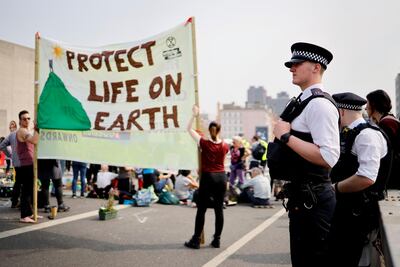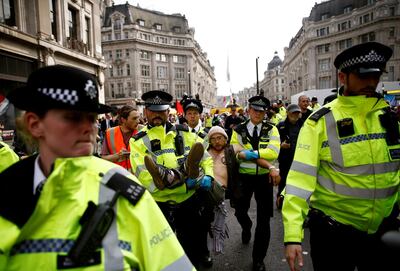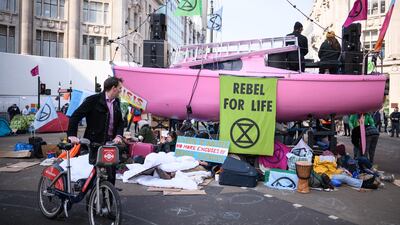Climate change protestors glued themselves to a train in London as activists brought disruption to the capital’s businesses, roads and railways for a third day in a row on Wednesday.
Extinction Rebellion blocked major roads and bridges across central London, including Waterloo bridge and popular shopping hotspot Oxford Circus.
The Metropolitan Police say 340 people have been arrested so far.
A man and a woman glued themselves to the top of a train carriage in Canary Wharf station, servicing the capital’s financial district. Both were later removed and carried off by officers.
Earlier on Wednesday morning, police ordered Transport for London (TfL) to shut down the London Underground wifi connection in a bid to stop activists using the network to cause travel disruption.
Extinction Rebellion had warned on Tuesday that it would target the city’s train networks without mentioning specific locations.
The movement is demanding the UK government to take immediate action on climate change.

“The time for denial is over. It is time to act,” the group says on its website.
“Conventional approaches of voting, lobbying, petitions and protest have failed because powerful political and economic interests prevent change. Our strategy is therefore one of non-violent, disruptive civil disobedience – a rebellion.”
Protests have also taken place in Edinburgh, Cardiff and Belfast.
Mayor of London Sadiq Khan said he “understands some of the reasons why” the environmental campaign group is protesting but says protesters are “inadvertently driving people away from public transport”, with increased train and bus usage a key strategy for the mayor in keeping pollution down on the roads.

Disruption to roads and rail have hit local businesses hard.
New West End Company which represents retailers in London’s West End estimates it has lost £12m in sales over the last two days when demonstrations by 'Extinction Rebellion' climate change protesters have taken place.
Takings and footfall are down by up to 25% in some stores, the New West End Company said, as it called on police to “take control of the situation”.
Robin Boardman, one of the chief coordinators with Extinction Rebellion, walked off in a live television interview on Sky News on Wednesday after a conversation with anchor Adam Boulton turned sour.
“We are failing as a species. We are failing people. I care so deeply about the people in this world and all the life on it and I will not see it die, I will not see it go this way,” Mr Boardman said.
Boulton interjected and asked why they chose a week when parliament isn't in session to hold the protests adding that he believed they were “incompetent” and “middle-class.”
“Millions of people are going to starve, starting with those in Africa. We are seeing the effects that it is having now,” replied Mr Boardman.
“If we face another hot summer this year we are going to see the effects right here in the UK.”

